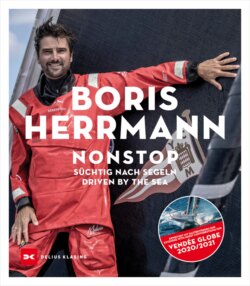Читать книгу Nonstop - Boris Herrmann - Страница 23
На сайте Литреса книга снята с продажи.
ОглавлениеFew solo sailors can do this as well as the German. Alex Thomson is one of them, a born entertainer, as is his countrywoman Pip Hare. But most of the others come across as much less inspired, less eloquent, more closed – as if they were just fulfilling a duty.
“He’s at peace with himself,” says Sidney Gavignet, a renowned high-sea sailor from France, the land of the sailing philosophers. This is like a knightly accolade. Boris, he says admiringly, speaks “like a prince of the sea.”
He makes good use of the organisers’ package offer of almost unlimited internet access via satellite. In this Vendée Globe, Herrmann is “always on”. Before the start he set up a WhatsApp group in which the 33 skippers can communicate with each other. And he’s active in a handful of other groups in his own periphery with which he’s always in contact. Never before has a Vendée skipper allowed people to look so closely over his shoulder and into his soul.
Proximity and immediacy are boosted enormously in social media. Even before the start, Herrmann was the sailor with the most Instagram, Twitter and Facebook followers in Germany. Now, at sea and alone, his candid video clips and audio messages have enabled him to multiply the numbers he is reaching. With the lockdown in pace at home, even fans with no knowledge of sailing can identify with his isolation. And everyone who sails is suddenly getting calls from their friends who only want to talk about the Vendée Globe. Boris Herrmann has become a superstar, a man of the people.
FLY, BORIS!
Because his campaign is also committed to climate protection, with he and his wife Birte having developed a school project that informed more than 20,000 children worldwide during the race about the importance of the oceans, he has a very broad appeal. He’s the good-looking, unaffected guy in the red and white Norwegian sweater, who even after a major mishap can still convey confidence in his videos.
Carried on a wave of affection, he still has something left for the finish. He, the outsider, the skipper with one of the smallest teams and a tight, at best average budget, is sailing into the Bay of Biscay with a chance of winning this thing. Back in Hamburg, Frank Schönfeld, a sail maker and singer, rewrites a song that becomes a hymn: Fly, Boris!. On the eve of the expected finish, the last of a hundred extrapolations predicts that first place is theoretically possible, second place probable.
“The last few miles,” says Boris Herrmann in an audio message to his friends. “The die is cast, the cards are on the table. This is the most exciting moment I could have imagined, more exciting than I would have wished for.” He curbs expectations, including his own. Fifth place is still the most realistic option, he says, and adds that he doesn’t want anyone to ask him afterwards, “why we didn’t win”.
He checks his systems and his radar multiple times. As he has during the entire race, he takes the utmost care not to exceed the load thresholds of his foils and the rig. It’s foggy, windy. The Seaexplorer – Yacht Club de Monaco is dashing through the night at around 17 knots as he goes to his berth for a final lie down to remain fit. Then he crashes, without hearing a proximity alarm, into a Basque high-sea trawler. He has no choice but to listen to the sound of his carbon fibre hull scraping against the steel plate of the fishing boat, his torn foresail flapping in the wind. He sees the images that will remain with him forever. Scenes like those of a horror film for someone five hours away from the fulfilment of his life’s dream.
EVEN THIS HE SHARES WITH THE WORLD
In this race, there is almost nothing separating them – luck and misfortune, ebullient celebration and existential concern, high spirits and tension, success and failure. To be a sea hero, celebrated and worshipped, or a daredevil.
